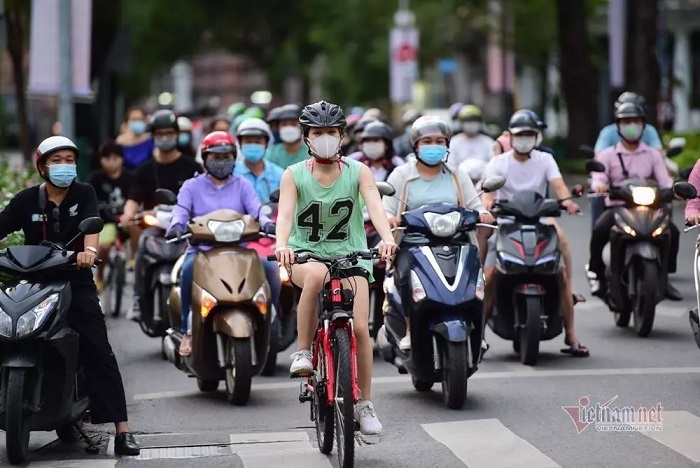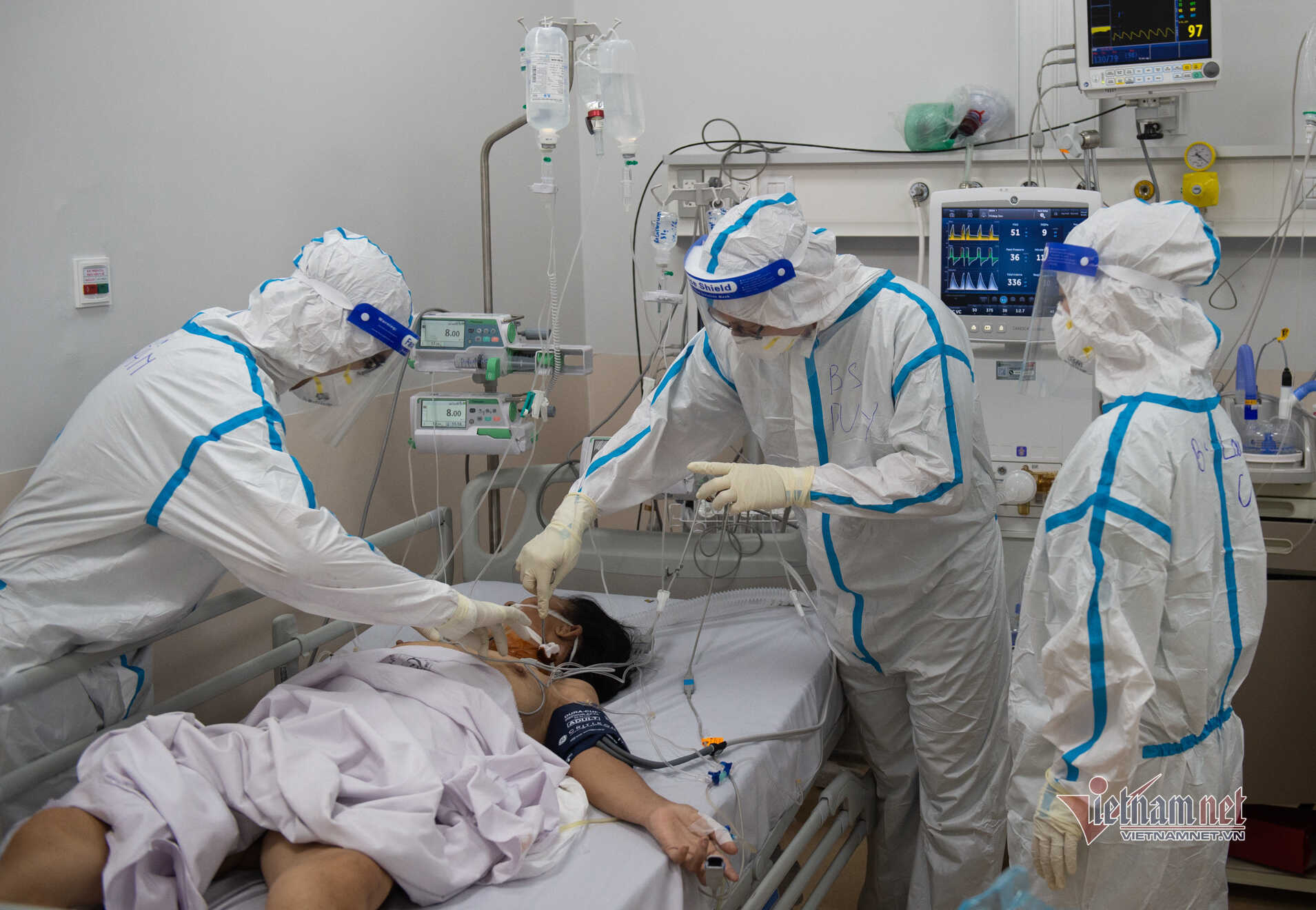 |
| The vaccination campaign in Ho Chi Minh City. Photo: VietNamNet |
Herd immunity in the first half of 2022
Reading the Government's report, which mostly refers to the epidemic situation and is different from previous similar reports, Deputy Prime Minister Pham Binh Minh reiterated the vaccine strategy and said: "Get herd immunity as early as the first half of 2022."
Four months ago, Prime Minister Pham Minh Chinh set the new epidemic prevention strategy of "5K + vaccines" and technology, besides the old way of "tracing, zoning ...".
To implement this strategy, Vietnam aims to vaccinate at least 70% of the population in the second half of 2021, and "basically" Vietnam has had access to 150 million doses of Covid-19 vaccines, as Deputy Minister The Ministry of Health Truong Quoc Cuong said at a Government press conference on June 3.
In the context of a worldwide shortage of vaccines, such a goal shows the determination and efforts of health workers but it seems to be very difficult to achieve, and causes too much expectation from the people and businesses trying to access vaccines.
During the past few months, Prime Minister Pham Minh Chinh made many phone calls with leaders of countries during which he asked for their help for Vietnam to get vaccines.
The Government’s extremely valuable effort was made in the context that we seem to have missed the "golden time" to order vaccines, when pharmaceutical companies were still in the research and testing stages late last year.
But Vietnam has not received many vaccines yet.
Therefore, clearly determining that until the first half of 2022 Vietnam will achieve herd immunity, as Deputy Prime Minister Pham Binh Minh told the National Assembly, will help people and businesses identify the problem in a timely manner, so we will not be subjective about the epidemic.
This issue is understood by the National Assembly. Chairman of the Economic Committee of the National Assembly Vu Hong Khanh said that as of July 13, Vietnam had received about 8 million doses of vaccine, of which 4,079,066 doses were given.
Why is the epidemic spreading, and 19 southern provinces, especially Ho Chi Minh City are currently under social distancing under Directive 16? And we have vaccines but the vaccinations are unable to be implemented?
Khanh raised the issue: “Our country's vaccine strategy faces many challenges, the proportion of the population being vaccinated is still low. Many Asian countries, including Vietnam, are at risk of missing out on the world economy’s pace because they don't have enough supply and technology to produce vaccines.”
That comment clearly puts pressure on the health sector, as even though doctors, health workers and many others are straining against the epidemic.
And the people are worried.
The report summarizing opinions and recommendations of voters and the people said: “Constituents and people are still worried in the context of global vaccine scarcity, and weak commitments of suppliers while Vietnam has not been able to produce its own vaccines yet, so there must be a really breakthrough and feasible solution to achieve the vaccination rate of 75% of the country's population as planned by the Ministry of Health.”
The report said that if the vaccination plan is not achieved, the plan for socio-economic development recovery will be delayed, people's lives will continue to be difficult, especially the disadvantaged, including people who have lost their jobs or are underemployed due to social distancing measures amid the Covid-19 epidemic.
The economic front still has to be prioritized
 |
| Deputy Prime Minister Pham Binh Minh reiterated the vaccine strategy, vaccine purchase, and logistics: "As soon as possible, herd immunity will be achieved in the first half of 2022 at the latest." Photo: VietNamNet |
The pandemic has had a great impact on people's lives. In the second quarter of 2021, the whole country had 12.8 million people aged 15 years and older who were affected by the Covid-19 epidemic, including those who lost their jobs, had to take time off/rotational leave, had reduced working hours, and reduced income.
Those are the statistics for the second quarter.
As for the current outbreak, which has made 19 provinces impose social distancing under Directive 16, how many more people will be affected?
Basically, the current way of fighting the epidemic is still about "distance", to buy time to wait for vaccines. What are the lessons for that cure, when HCM City has had to allow F1 and even F0 cases to be under home quarantine to avoid overloading the health system?
To combat the Covid-19 epidemic, it is necessary to have a systematic view. This is a complex problem with many parameters, many objectives, and many subproblems that need to be solved synchronously. If we do not realize this, do not anticipate the complexity of the problem, do not predict the situations that will occur and do not have the appropriate strategy, and do not prepare in advance but always run after the situation, it can easily lead to disorder or lack of control.
Fighting Covid-19 is not only an epidemiological problem but also an economic and system/social management problem in very complex conditions. It is necessary to have systematic thinking, to accurately identify the problem that needs to be solved in order to allocate resources for implementation and find solutions, in a synchronous manner.
Even when a city is under social distancing or lockdown, important activities must still operate: pharmacies, food stores, security, traffic, sanitation systems... still have to work. In order for people to still be fully provided with, for example, food, there must be preparation in terms of food sources, logistics, supply and distribution systems, purchasing systems, online ordering and shipping. That is not to mention that many people do not have the skills and conditions to buy and sell food online.
To do these things we need elaborate preparation. If the scale of the epidemic continues to expand, then what will happen?
Once the city is blocked, the poor will no longer have a livelihood, so how will the government help them? How much will the state give them, and in what way to be effective?
Speaking frankly with the people about the epidemic and vaccines can help both the state and the people to prepare well and find the right solution, an arduous and long process in the immediate future, to reduce negative consequences of the epidemic.
Tu Giang

New Covid-19 situation, new behavior
In the new situation, social distancing may cover almost the whole country, affecting tens of millions of people and hundreds of thousands of businesses, and the supply chain of the whole country or at least a large economic area will be broken.

Public told to remain hyper-alert as Covid-19 spreading rapidly in community
If the number of severe Covid-19 cases that need endotracheal intubation, ventilators and resuscitation rises too high, Vietnam’s medical resources will be overloaded, experts have warned.